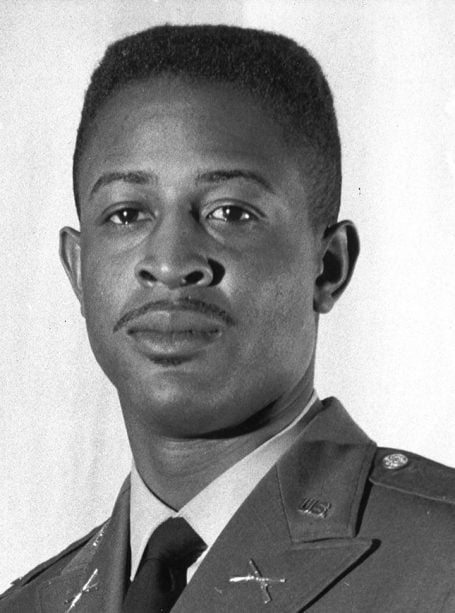

Riley Pitts
Riley Leroy Pitts was born in Fallis, Oklahoma in 1937. He graduated college from Wichita State University, the first in his family to do so, and after graduation married his wife, Eula. The couple had two children – Stacie and Mark – while Pitts worked for Boeing.
Pitts enlisted in the U.S. Army in 1960 and arrived in Vietnam in December of 1966. He started out as an Information Officer, but eventually left to serve within a combat unit. Finding his way to C Company, “Wolfhounds”, 2nd Battalion, 27thInfantry Regiment, 25th Infantry Division.
While serving as Company Commander of C Company on October 31, 1967, a month away from returning home to his family, Pitts and his men were sent to Ap Dong. Upon arrival, he led his company through an enemy assault, with multiple bunkers firing at the men, from distances as close as 50 feet.
At one point he launched a grenade at enemy troops, but it hit jungle foliage and was hurled back towards him and his men. He immediately, and without hesitation, pounced upon it. It did not explode, and Pitts stood and continued to lead his men through battle until he was killed by enemy fire.
U.S. Army Captain Riley Pitts was awarded the Medal of Honor, the nation’s highest award for valor, posthumously on December 10, 1968, by President Lyndon B. Johnson. The medal was presented at the White House with his parents, his widow, and his two young children in attendance.
Pitts was inducted into the Oklahoma Military Hall of Fame in 2000.
The Citation for the Medal of Honor read:
Distinguished himself by exceptional heroism while serving as company commander during an airmobile assault. Immediately after his company landed in the area, several Viet Cong opened fire with automatic weapons. Despite the enemy fire, Captain Pitts forcefully led an assault which overran the enemy positions. Shortly thereafter, Captain Pitts was ordered to move his unit to the north to reinforce another company heavily engaged against a strong enemy force. As Captain Pitts’ company moved forward to engage the enemy, intense fire was received from three directions, including fire from four enemy bunkers, two of which were within 15 meters of Captain Pitts’ position. The severity of the incoming fire prevented Captain Pitts from manoeuvering his company. His rifle fire proving ineffective against the enemy due to the dense jungle foliage, he picked up an M – 79 grenade launcher and began pinpointing the targets. Seizing a Chinese Communist grenade, which had been taken from a captured Viet Cong’s web gear, Captain Pitts lobbed the grenade at a bunker to his front, but it hit the dense jungle foliage and rebounded. Without hesitation, Captain Pitts threw himself on top of the grenade which, fortunately, failed to explode. Captain Pitts then directed the repositioning of the company to permit friendly artillery to be fired. Upon completion of the artillery fire mission, Captain Pitts again led his men toward the enemy positions, personally killing at least one more Viet Cong. The jungle growth still prevented effective fire to be placed on the enemy bunkers. Captain Pitts, displaying complete disregard for his life and personal safety, quickly moved to a position which permitted him to place effective fire on the enemy. He maintained a continuous fire, pinpointing the enemy’s fortified positions, while at the same time directing and urging his men forward, until he was mortally wounded. Captain Pitts’ conspicuous gallantry, extraordinary heroism, and intrepidity at the cost of his life, above and beyond the call of duty, are in the highest traditions of the United States Army and reflect great credit upon himself, his unit, and the Armed Services of his country.
Captain Pitts is remembered on Panel 28E, Line 105.
Articles
Video

